52.2% of experts who took part in our State of Link Building study find link building the most challenging part of SEO. This figure is consistent with other studies, like the poll by the Authority Hacker’s Gael Breton on X.
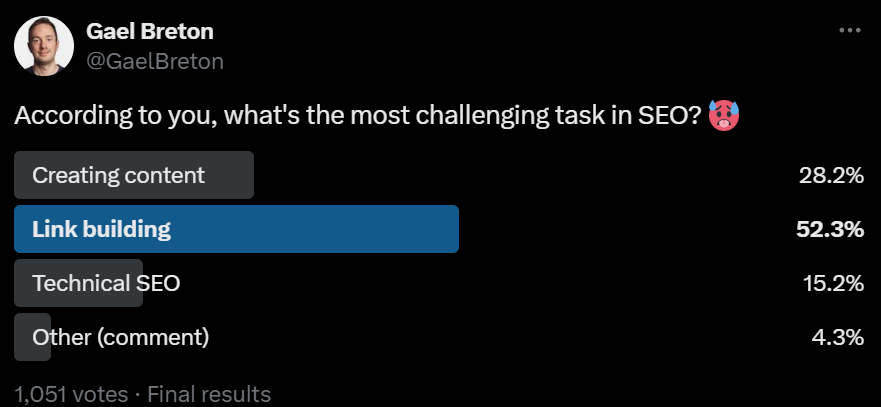
What makes it so difficult?
In the article, we explore 10 major link-building challenges, backed up with insights from SEOs and marketers on how to tackle them.
Is Link Building Important Now?
Let’s break this question down into two.
First, are backlinks important?
No doubt about it. Backlinks are a ranking factor, and the strength of your backlink profile has a massive impact on search engine rankings.
Don’t believe me? Check out the study by Internet Marketing Ninjas. 85% of websites ranking on Page 1 had backlinks from at least 1k domains. And 60% of them - 10k and more.
Now, the second question: can you get these links organically without actively building them?
My experience shows that it’s possible if you’re a well-established brand, like Surfer or Semrush. Such companies place much less focus on link-building, and yet, the links come anyway because of their authority.
But if you aren’t a flagship name in your niche, you need to invest in link-building if you’re serious about competing in SERPs.
Why Link Building Is So Hard?
So, what makes link-building so challenging? I talked to 10 SEOs, marketers, and PR professionals, and here are 10 main reasons.
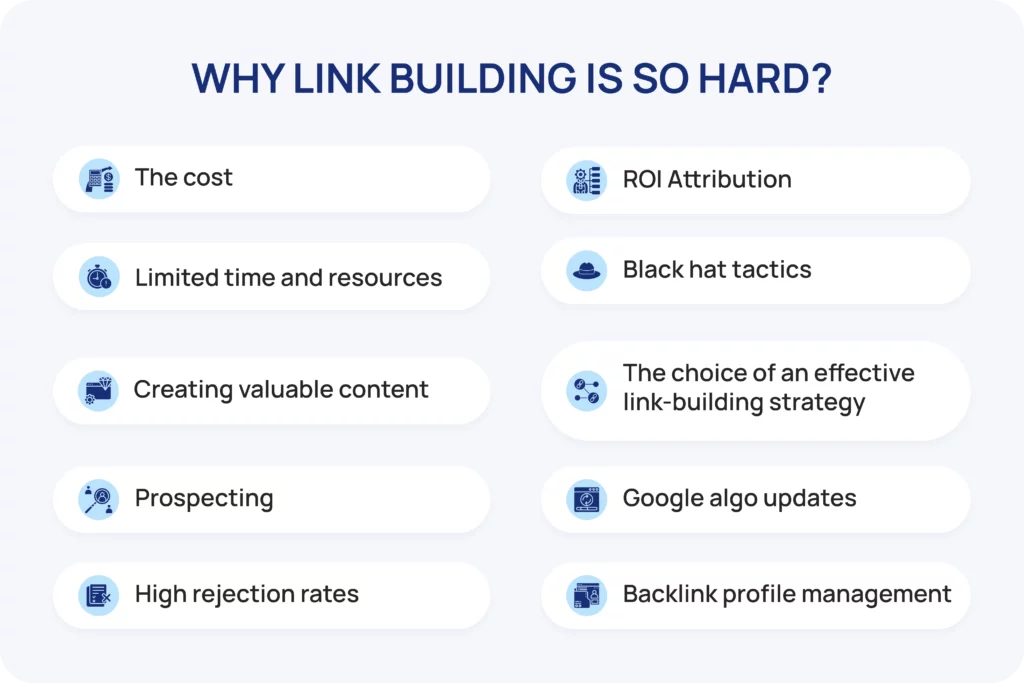
The cost
The first challenge is high link-building costs. Getting quality links is expensive.
If you hire a reputable backlink agency to manage your link-building needs, you will have to pay $50-1000+ per link, depending on your industry. And these often come in packages, so you’re looking at spending several grand a month.
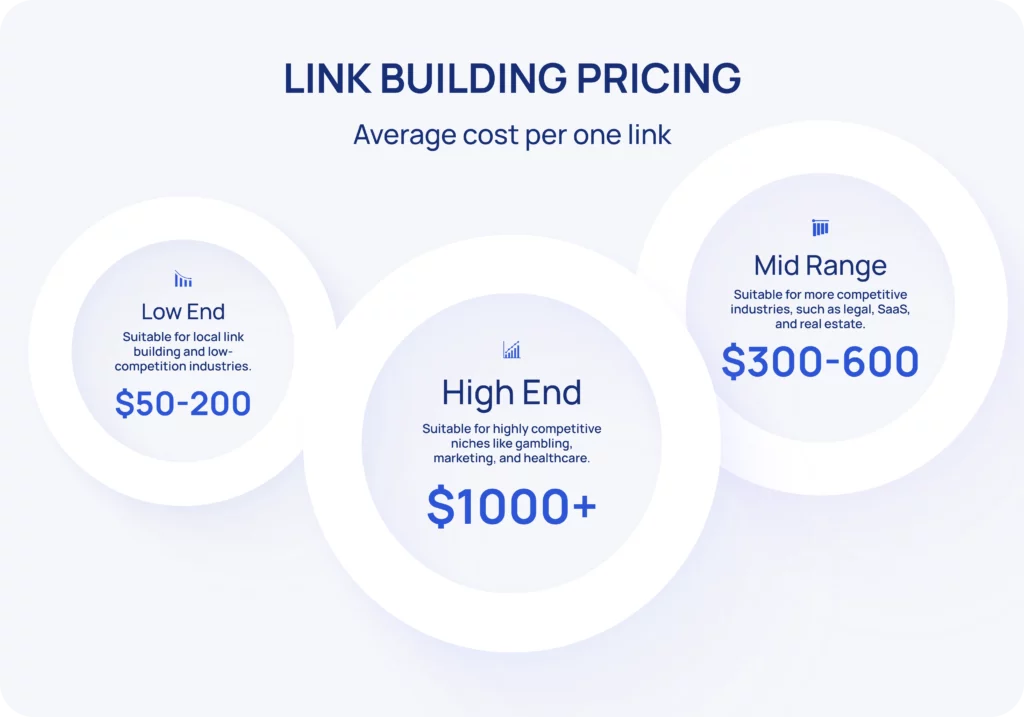
Sure, you can get links for much less, for example, from link farms, but are they worth it?
Brad Russell of Digital Hitman doesn’t think so:
If you find a vendor that charges dirt cheap and they readily offer and sell these services, chances are they’ve already sold their lot to 1000s of other webmasters, which Google could then identify those websites as link farms and immediately devalue their worth to nothing.
The alternative is building links in-house. If you go that way, you need to take into account the cost of hiring a link-builder, tool subscriptions, and outsourcing content creation. This can easily set you back by $100k+ a year and give you only a limited capacity.
And even if you run an in-house team, don’t expect the links to be free.
As many people online are more aware of the value of backlinks, site owners try to charge large fees for linking to 3rd party websites.
According to Authority Hacker, the average cost of a link in 2024 is $83.
Limited time and resources
Building links is expensive because it requires time and effort. Prospecting, content creation, finding innovative tactics and angles, personalized outreach, and tracking results all require substantial resources.
Molly Weybright of Service Direct believes it’s particularly challenging for smaller teams as they stretch themselves thin trying to cover all bases and end up in a chicken-and-egg situation:
With these limited resources, it can feel like every part of our SEO strategy suffers. When I spend hours every week researching and emailing prospects, I have less time to dedicate to writing high-quality content, which leads to fewer incentives for companies to link to us. It’s a vicious cycle.
Creating valuable content
Molly mentions the ability to create quality content as one of the limiters for link-builders.
Other experts agree that you need to create high-quality, valuable content to get links. Otherwise, why would anyone link to your website?
High-quality content is at the core of any effective link-building strategy, but it’s also one of the hardest parts to execute well. Creating shareable, insightful, and niche-specific content takes significant research and creativity.
Creating such content is becoming increasingly difficult due to oversaturation. That’s why Brad Russell believes that creating truly ‘linkable’ content that cuts through the noise isn’t feasible for most companies.
Think about it:
How many businesses have the capacity to conduct original research that uncovers new ground, offer expert insights with a unique perspective not yet covered elsewhere, or build free tools or calculators that don’t exist yet?
Prospecting
Finding relevant and authoritative websites requires tons of resources as well. Especially when you’ve been doing it for a while, points out Barbara Sawala, the Head of SEO at Soul & Mind:
The more links a site has, the more time you’ll need to invest in prospecting, as you’ll have already explored many sources and will need to dig deeper to find new opportunities.
Evelina Milenova, the SEO Manager at Opinion Stage, adds that this is particularly challenging for smaller teams:
For in-house teams, there’s an additional challenge – you need to keep establishing contacts with new domains while you have limited opportunity to keep reusing them.
Why can’t you reuse the same sites?
Links from unique domains are more valuable. Two votes of confidence from two different sites mean more than two from the same one. So, if you’ve already swapped a link with a site, subsequent exchanges are less attractive.
So what’s the solution?
Let’s imagine you start with competitor analysis. Assuming you manage to replicate your competitors' links, expand your search to categories, so if you have a link from one AI writing tool’s blog, target other similar ones.
Next, Barbara recommends exploring different search angles. For example, when looking for restaurant websites, you could search for, "dog-friendly restaurants in London" or "foodie places London."
High rejection rates
High rejection rates are another factor that makes link-building resource-intensive, according to Evelina:
The average success rate of link-building outreach is below 5%. I use highly personalized emails, and even then, the rate of live links vs. sent emails would be between 10-16%. This means you’d need to send emails at a scale to get a steady flow of links.
Why such a high rejection rate?
Tomasz Borys, Sr VP of Marketing and Sales at Deep Sentinel, names oversaturation as the main cause:
The reasons vary—from receiving no response to outright refusals—but the underlying issue is a SATURATED MARKET where everyone is vying for the same coveted links. Websites and bloggers are inundated with requests, making it difficult to stand out.
Will Rice, the SEO & Marketing Manager at MeasureMinds, echoes that:
The link-building market is now so oversaturated with low-quality domains and outreach that as soon as people get these types of communications, they tend to go straight into the bin.
Will mentions two more common reasons for rejections: poor website quality and lack of relevance.
So, what can you do to increase your chances?
Invest in your website and vet your prospects more thoroughly.
Make a great website and then focus on your link-building – people will be much more willing to work with you. …And make sure that you’re only reaching out to people who are going to find it relevant. High rejection rates often come from having poorly vetted prospects.
Sometimes, there isn’t much you can do about it. For example, we often get turned down because of our DR. While we’re working on it constantly, it isn’t something you can improve overnight.
So, my advice? Don’t take rejections personally. It’s just business.
ROI Attribution
Attribution is one thing that complicates the lives of marketers and SEOs big time.
I mean, it’s easy to tell whether a link-building campaign was successful or not. But did it help you to achieve your business goals? Like increasing your customer base or revenue? Not so simple anymore.
One reason is that links are just one factor in the whole puzzle game, so it’s hard to tell how much impact they have on your OKRs compared to others, like on-page content optimization that you might have been doing in parallel.
Secondly, as Jason Davis points out, the results aren’t immediate:
Many find it difficult to track the ROI of link-building efforts, as results are often delayed. Unlike paid ads, the impact of link-building isn’t immediately visible.
Why does it matter?
In times of budget cuts, not being able to attribute results to link-building can undermine your leadership buy-in. This makes it challenging to secure the funding that you need to deliver links. This may further exacerbate the resource shortage discussed above.
Black hat tactics
Considering how much effort goes into link-building and how long you have to wait for results, it may be tempting to resort to black-hat tactics.
Part of the problem is that such tactics are still very popular. 92% of our study participants believe that their competitors buy links. And they often yield results.
Sometimes, you may be getting pressure from your clients to speed things up and rely on dodgy practices.
How do you resist it?
Claudia McKenzie, the Outreach Lead at Orange Line, focuses on client education:
When we get asked to do something that isn’t feasible unless we cheat, we educate our clients on the risks of penalties and the long-term gains of doing things the right way. Sustainable growth beats a quick buck every time.
What if your link-building agency uses unethical tactics?
Depends on how deeply ingrained they are in their processes. Many companies have built their business on black-hat tactics, so they may not be able to deliver results otherwise. That’s how they roll.
So, parting ways may be the only way. Which is hard if it’s bringing results because it’s often difficult to see that their impact is only short-term.
The choice of an effective link-building strategy
If black hat tactics are a no-go, what tactics should you use to build links? What’s the best link-building strategy?
Digital PR, according to our survey participants.
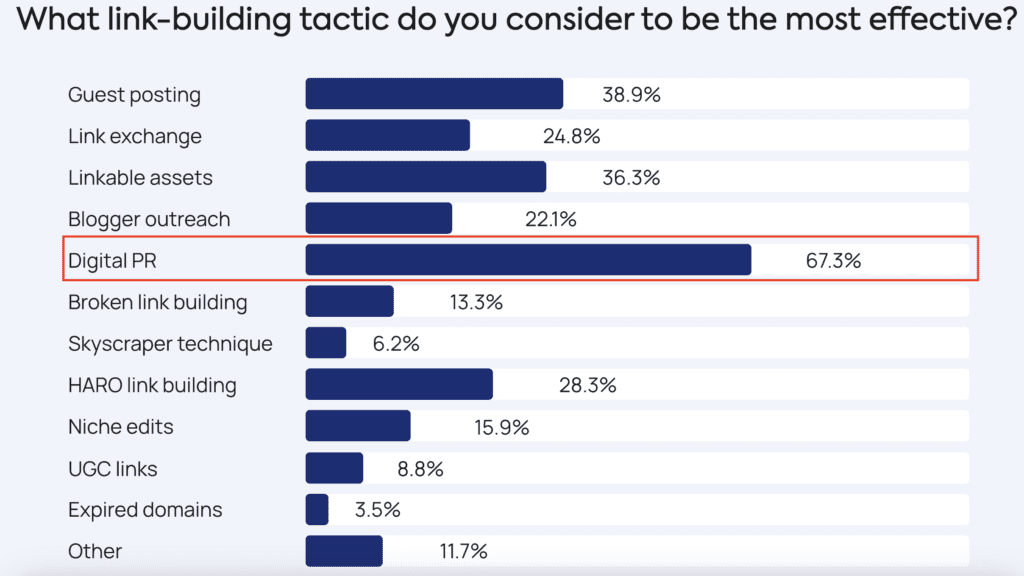
That’s because it doesn’t focus on link-building as such but on growing your brand visibility, explains Brad Russell:
What people forget are the best strategies for link building are ones where you don’t need to deliberately think about “backlink building” as a strategy, but instead genuine brand-building or crosses over to digital PR.
There’s no doubt that digital PR can be super-effective. A single campaign can get you a bunch of links from highly authoritative media outlets with a huge readership. Even if they’re nofollow, they still bring tons of referral traffic to your site.
But Brad admits that these tactics are difficult to implement for many businesses.
Reliance on one tactic can be risky because, as mentioned, results take a while to generate, and you won’t see if your strategy is effective for a while. So you could spend a lot of money on something that brings no result.
Moreover, using just one tactic, say guest posting, gives you only one type of link, and this makes your link profile unnatural.
So, instead, we recommend using 3-6 tactics to mitigate the risks.
Google algo updates
Search engine algorithm updates are another thing that you need to cope with when planning your link-building efforts.
Google constantly updates its search algorithms to improve the quality of search results. And links are often one of the factors that they affect.
For example, the 2012 Penguin update targeted spammy link practices like buying links from link farms, and that’s when Google started dishing out manual penalties. In 2022, the rollout of SpamBrain changed how Google treats spammy links: instead of penalizing sites, it just ignores them. And in 2019, Google stopped ignoring nofollow/ugc/sponsored links when ranking content.
As a link-builder, you need to keep on top of all these changes and industry best practices for your campaigns to work. (This is also a reason to diversify your link profiles. If you rely on one tactic and the big G suddenly decides it’s meh, you’re shafted.)
And even if the update doesn’t directly concern backlinks, it can still wreak havoc in SERPs, as we’ve seen from the 2023-24 core and helpful content updates over the last couple of years. This affects your ability to deliver on business objectives. And makes attribution even more challenging.
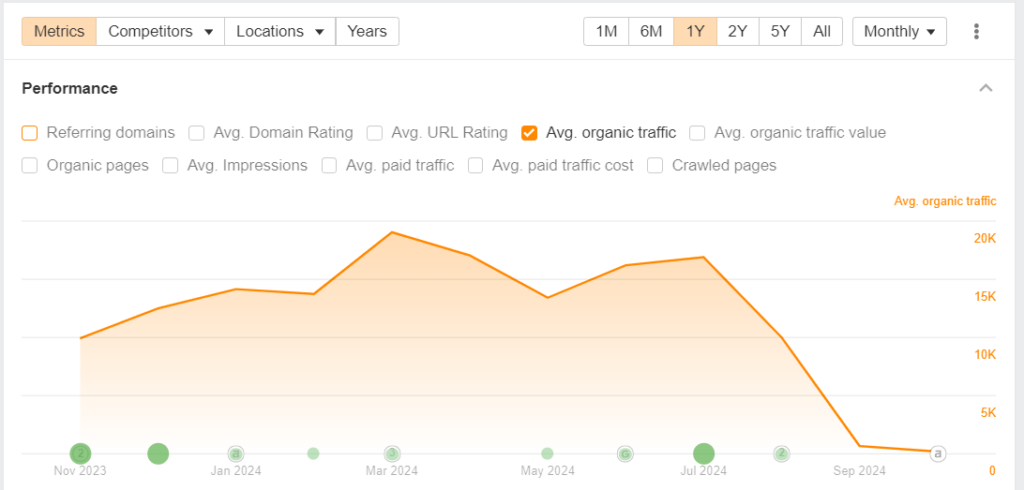
Backlink profile management
Backlinks profile management is much more complex than just the number of links you have and the DR and traffic of the pages that they come from.
Factors like link placement in the website structure, whether it's follow or nofollow, the anchor text, the specific page the link appears in, or the context surrounding it matter a lot, too.
And as a link-builder, you don’t always have control over such aspects, says Szymon Slowik:
Many links acquired naturally or through outreach, using linkable resources, are nofollow, come from sites with a lot of outbound links, have poorly matched anchors, and, most importantly, direct to the homepage or resource page rather than the page you want to strengthen.
What’s the solution?
Szymon recommends using methods that give you control, like purchasing publications from reputable publishers through high-quality backlink marketplaces.
What difference does it make whether we pay the publisher (directly or through an SEO agency) or a digital PR agency that creates something for the publisher and persuades them to link back?
This may get you in the gray or even black area, though, unless the link is marked as ‘sponsored.’
Guest posting is another way to maintain control over your link placement.
A lot here depends on the quality of your relationships with your link-building partners. The closer you work together, the more you can ask for.
Final Words
Let’s face it: if you want an easy job, link-building isn’t for you. Competition is fierce, the goalposts are constantly moving, and teams are regularly underresourced to face the challenges.
Navigating such a landscape requires expertise, skills, and networks that may be difficult to build in-house. And sometimes, it makes more sense to focus your internal teams on other high-value activities and outsource link-building to a reputable agency.
If you’re considering this option, get in touch with the Editorial.Link team! We can help!











